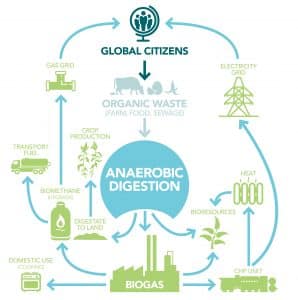World Biogas Association at COP26: “Anaerobic digestion a key technology to reduce methane emissions and fulfill Global Methane Pledge”
World Biogas Association at COP26: “Anaerobic digestion a key technology to reduce methane emissions and fulfill Global Methane Pledge”
- Anaerobic digestion (AD) reduces methane emissions by treating harmful-gas-emitting organic wastes and transforming them into valuable bioproducts
- Around 25% of methane emitted into the atmosphere annually comes from the 105bn tonnes of organic wastes produced through human activity every year. Methane is 86 times more potent than CO2 in the first 20 years after release.
- On Wednesday, at COP26, the World Biogas Association will call for an overhaul of waste management systems to ensure organic wastes are treated through AD.
- It will do so at an event held in partnership with the Kenya Climate Change Working Group, featuring the Second Ladies of Kenya and Ghana as keynote speakers.
Next Wednesday 10th November, the World Biogas Association (WBA) will call for the transformational change of waste management systems at a livestreamed COP26 Blue Zone event, during which it will demonstrate the critical value of anaerobic digestion (AD) in reducing global methane emissions. Human activities generate billions of tonnes of organic wastes annually which, left untreated, emit vast amounts of methane alongside other greenhouse gases (GHG).
A key theme of COP26, as illustrated by the formal launch of the Global Methane Pledge in Glasgow, is cutting down emissions of methane – a greenhouse gas 86 times more potent than CO2 in the first 20 years after release into the atmosphere. Over 100 countries have now signed up to the pledge, which commits them to reducing their emissions by 30% from 2020 levels by 2030. This will serve to reduce global temperatures by at least 0.2C by 2050, say the Inter-Governmental Panel on Climate Change.
The Global Methane Assessment published by the UN Environment Programme and Climate and Clean Air Coalition in May 2021 recognises AD as “one of the key technologies that can deliver methane reductions at low cost”. The US Environmental Protection Agency calls AD ‘a common sense technology’ to reduce methane emissions, whilst AD has an ‘integral role’ to play in the EU’s methane strategy.
Organic wastes across food, farming, landfill and wastewater treatment are responsible for around 25% of global methane emissions caused by human activity annually. AD treats the organic matter from those sectors and transforms it into biogas, a biofertiliser and bioCO2, – valuable bioproducts which can displace fossil equivalents in the carbon-intensive heat, transport, agriculture and food and drink industries, thus helping decarbonise huge sections of the economy.
WBA modelling for the Biogas: Pathways to 2030 report, published in March this year, shows that preventing emissions of methane and other harmful gases from organic wastes can have the net effect of reducing global GHG emissions by 10% by 2030. Crucially, AD is a mature, readily available technology that can be deployed without delay and therefore make an immediate and critical impact.
Drew Shindell, lead author on the UNEP/CCAC Global Methane Assessment report, Climate and Clean Air Coalition Special Representative for Methane Action, and Nicholas Distinguished Professor of Earth Science, Duke University, explains: “The waste and agriculture sectors represent more than half of human-driven methane emissions. As part of a portfolio of actions, AD technologies can provide substantial, low-cost mitigation in these sectors this decade while simultaneously producing useful products such as biogas.
“Using AD to turn organic food, farm and sewage waste into biogas and biofertiliser that can be sold or used on-site to generate energy, can help reduce methane and create a sustainable source of revenue and job creation. Furthermore, local to industrial scale AD technologies are well understood and have operated around the world for nearly half a century. These technologies are readily available, low-cost, and well positioned to achieve global scale to deliver immediate and cost-effective action on climate change.”
The WBA COP26 event, held in partnership with the Kenya Climate Change Working Group (KCCWG), will be streamed live on Wednesday 10th November from 16.45 GMT until 18.00. Johan Kuylenstierna, Research Leader at the Stockholm Environment Institute and Reader at the University of York, will open the event. He will be followed by the Second Lady of Kenya Rachel Ruto and the Second Lady of Ghana Samira Bawumia as keynote speakers.
Charlotte Morton, WBA Chief Executive, concluded: ‘Recycling the 105bn tonnes of methane-emitting organic wastes we humans produce every year through anaerobic digestion is an easy win – it is a technology widely used across the world today. But it is not widely known as a solution, so we are delighted to be given this opportunity to showcase the value of anaerobic digestion and biogas in reducing methane emissions to the world’s most influential players in the climate change agenda. COP26 is humanity’s last chance to secure the political and financial commitments to avert a climate catastrophe and we owe it to current and future generations to ensure that all available technologies are exploited in order to keep global warming below the critical 1.5°C tipping point.”
REGISTER TO THE EVENT HERE
– ENDS –
For further information, contact:
Jon Hughes, Head of Communications
jhughes@worldbiogasassociation.org ; +44 (0)20 3176 0503
Notes to editors:
- How AD works

- Launched at COP22 in Marrakesh in 2016, the World Biogas Association is the global trade association for the biogas, landfill gas and anaerobic digestion (AD) sectors, and is dedicated to facilitating the recycling of all organic wastes, crop residues and break crops through biogas globally. It believes that the global adoption of biogas technologies is a multi-faceted opportunity to produce clean, renewable energy, bioCO2 and natural fertilisers while resolving global issues related to development, public health and economic growth. www.worldbiogasassociation.org


